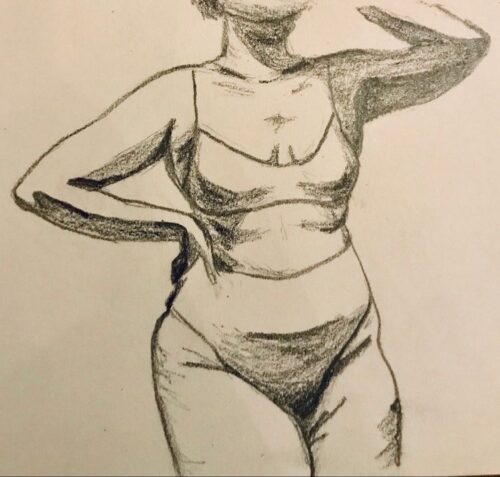
More than a canvas: Body Shaming
Written by Ms Batfobile Dlamini
September, 29, 2022
I grew up hearing that I was black and ugly. My family members often called me “mnyamane” (Blackie), a disdainful commentary on my darker skin. Then puberty made its presence known with a bloody loud announcement. One day I was sitting in class, and bam! red stained chair and tunic. I was mocked for an entire school term for something I honestly could not have controlled. I felt ashamed about having my period. More than that, I developed a complicated and difficult relationship with my body because throughout my childhood it had not brought me good attention. By the time I became interested in boys or had an understanding of sexuality, my distorted body image was imprinted into the recesses of my mind.
Many people have distorted images and beliefs about their bodies, some of these come from a place of not coming to terms with what the body is. When others express a misunderstanding or experience a distortion of what is real and natural, disgust and disdain can occur. This can lead to a terrible practice called “body shaming.” Body shaming is mocking or stigmatizing someone by making critical comments about their body shape, size, or appearance. Body shaming can occur at any age. In the earlier period of our lives, our body parts are labeled with derogatory nicknames instead of proper terms like vagina or vulva. It worsens as we reach puberty when our bodies change. Most women are taught that something is wrong with the appearance, smell, or taste of their genitalia. Bodily functions and fluids are seen as gross. For instance, menstrual blood is not thought of or treated like blood from a cut in the finger. Sexual exploration is forbidden or taboo amongst women, and there is still a strong message that female sexuality exists to pleasure men. These instances can translate into a lack of confidence, low self-esteem, and depressive thoughts.
Subsequently, body shaming has dire consequences on the sexual reproductive health of women. Most women know the significance of regular breast checks or STI screenings. However when it comes to vaginal medical examinations, there is resistance and reluctance. Not only does this indicate how internalised body shaming becomes, but also that women are yet to come to terms with what their bodies are.
Women will ignore symptoms that involve their vulva or vagina because they feel embarrassed or ashamed; that there is something unnatural about these parts of them. Issues around sexual health after birth, pain with sex, and endometriosis are rarely discussed and go on without treatment or diagnosis. Furthermore, negative body image is one of the biggest causes of the widening orgasm gap, disrupting sexual enjoyment, desire, and responsiveness in women. When a woman has been body-shamed, these negative body images serve as an ongoing distraction during sexual encounters, making the interaction less pleasurable and intimate.
Coming to terms with the nature and state of the body is so important. It not only leads to more pleasant sexual experiences, but brings more women closer to living healthier lives overall. Our bodies are more than a canvas for the clothes and make-up we use to cover them. They are real, biological and natural organisms that come in different forms and shapes. They are natural and physiological entities that go through illness and wellness, expansion and shrinkage; growth and deterioration. Seasons, diet, mental health, socio-economic circumstances all impact these bodies of ours. We have nothing to be ashamed of. When the sunflower hit by Spring bursts open exposing its pollen to the bees, it does not spend the next three months apologizing. When the slithery snake sheds its skin because it is time, it does not look back at its fellow snakes to see what they think of it. Both flower and reptile accept that it is nature, and nature has its ebbs and flows.
If we are to have a healthy outlook and relationship with our bodies, we must accept that they are not things that are only good enough to be displayed on Instagram. They are a part of nature. And that is an absolutely beautiful thing.
References:
- Image – https://pin.it/7fM259O
Ubusha Bami futhi yimi lo – My youth and this is me! © 29 September 2022